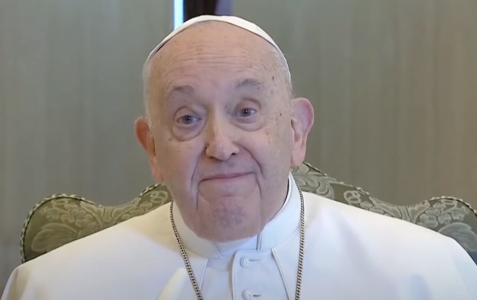A pope of firsts: The surprising legacy Pope Francis leaves behind
By
Veronica E.
- Replies 0
Not every pope gets remembered for shaking things up—but Pope Francis was never just any pope.
From his humble beginnings in Argentina to becoming the first Jesuit and Latin American pontiff, he broke molds from the very start.
Whether you admired his bold reforms or wrestled with his progressive tone, one thing’s clear: his papacy left a mark not just on the Church, but on the world.
His journey included an unprecedented path from a Buenos Aires nightclub bouncer to the leader of the Roman Catholic Church, a transformation that symbolized how deeply personal faith and service can evolve.
Pope Francis, who passed away at the age of 88, leaves behind a legacy shaped by courage, compassion, and an unwavering desire to make the Catholic Church more inclusive.

From the beginning, Francis made it clear where his heart lay—with the poor, the excluded, and the struggling.
He spoke up for migrants and refugees, supported those facing poverty, and even extended compassion to the LGBTQ+ community in ways that sparked discussion and, at times, pushback.
His strong stance on environmental responsibility also resonated with many around the world who were growing increasingly concerned about climate issues.
Francis famously chose to live in the modest Casa Santa Marta instead of the lavish papal apartments—a quiet but powerful symbol of humility.
He once likened the Church to a "field hospital after battle," reminding everyone that healing the wounded must come before theological debate.
As the first pope from the Americas, Francis brought a new voice to the Vatican—one that often challenged the familiar rhythm of tradition.
He made headlines by approving blessings for same-sex unions (while still upholding traditional views on marriage) and launched the most extensive revision to Church law in four decades to address the global sexual abuse crisis.
He called the scandal "our shame" and demanded more accountability.
But not all were ready for change.
Francis faced opposition from some within the Church, including in the United States, who were concerned about his views on issues like immigration, climate change, and social priorities.
Still, he remained focused on opening doors rather than closing them.
Even as Francis embraced reform, he remained rooted in Catholic doctrine.
He upheld the Church’s positions on abortion, clerical celibacy, and the ordination of women, though he did make space for women to take on more meaningful leadership roles within Church structures.
This balancing act—respecting tradition while pushing for relevance in today’s world—became a hallmark of his leadership.
Whether responding to global conflict or speaking out for displaced families, Francis led with both conscience and conviction.
Francis' papacy sparked conversation—and not always in agreement.
While many admired his emphasis on mercy and inclusion, others believed he didn’t go far enough in dealing with deep-rooted Church issues like clergy abuse.
Some said his messages were occasionally unclear, causing confusion among both followers and critics.
But what made Francis stand out was his openness.
He didn’t shy away from admitting missteps—such as in his handling of the Chilean abuse scandal—and he often chose listening over lecturing.
That sense of humility, combined with his personal warmth, made him approachable to many.
Pope Francis was a man of many firsts: the first Jesuit pope, the first from the Americas, and the first to take the name of St. Francis of Assisi—a name tied to peace, humility, and care for the poor.
His life and leadership reflected those same values.
As future leaders of the Church look ahead, they will have to contend with the path he helped pave—one that emphasizes compassion, calls for deeper engagement with the real world, and invites the Church to be more of a listener than a lecturer.
Read next: He warmed hearts on "Lassie"—Joey D. Vieira has died at 80

The GrayVine community, rich in wisdom and experience, understands the significance of such a transformative figure. How did Pope Francis’ leadership speak to you? Do you believe his changes will last? We’d love to hear your thoughts in the comments!
From his humble beginnings in Argentina to becoming the first Jesuit and Latin American pontiff, he broke molds from the very start.
Whether you admired his bold reforms or wrestled with his progressive tone, one thing’s clear: his papacy left a mark not just on the Church, but on the world.
His journey included an unprecedented path from a Buenos Aires nightclub bouncer to the leader of the Roman Catholic Church, a transformation that symbolized how deeply personal faith and service can evolve.
Pope Francis, who passed away at the age of 88, leaves behind a legacy shaped by courage, compassion, and an unwavering desire to make the Catholic Church more inclusive.

Pope Francis, known for his humility and compassion, leaves behind a legacy that challenged tradition and embraced inclusion. Image Source: YouTube / The Indian Express.
A pope for the overlooked
From the beginning, Francis made it clear where his heart lay—with the poor, the excluded, and the struggling.
He spoke up for migrants and refugees, supported those facing poverty, and even extended compassion to the LGBTQ+ community in ways that sparked discussion and, at times, pushback.
His strong stance on environmental responsibility also resonated with many around the world who were growing increasingly concerned about climate issues.
Francis famously chose to live in the modest Casa Santa Marta instead of the lavish papal apartments—a quiet but powerful symbol of humility.
He once likened the Church to a "field hospital after battle," reminding everyone that healing the wounded must come before theological debate.
A reformer who met resistance
As the first pope from the Americas, Francis brought a new voice to the Vatican—one that often challenged the familiar rhythm of tradition.
He made headlines by approving blessings for same-sex unions (while still upholding traditional views on marriage) and launched the most extensive revision to Church law in four decades to address the global sexual abuse crisis.
He called the scandal "our shame" and demanded more accountability.
But not all were ready for change.
Francis faced opposition from some within the Church, including in the United States, who were concerned about his views on issues like immigration, climate change, and social priorities.
Still, he remained focused on opening doors rather than closing them.
Also read: For the first time since he was hospitalized, Pope Francis has been seen in public. Is he okay?
Tradition and progress in tension
Even as Francis embraced reform, he remained rooted in Catholic doctrine.
He upheld the Church’s positions on abortion, clerical celibacy, and the ordination of women, though he did make space for women to take on more meaningful leadership roles within Church structures.
This balancing act—respecting tradition while pushing for relevance in today’s world—became a hallmark of his leadership.
Whether responding to global conflict or speaking out for displaced families, Francis led with both conscience and conviction.
Also read: Inside scoop: What’s really happening with the Pope’s health in the hospital? Vatican reveals details
Not always understood—but rarely ignored
Francis' papacy sparked conversation—and not always in agreement.
While many admired his emphasis on mercy and inclusion, others believed he didn’t go far enough in dealing with deep-rooted Church issues like clergy abuse.
Some said his messages were occasionally unclear, causing confusion among both followers and critics.
But what made Francis stand out was his openness.
He didn’t shy away from admitting missteps—such as in his handling of the Chilean abuse scandal—and he often chose listening over lecturing.
That sense of humility, combined with his personal warmth, made him approachable to many.
Pope Francis was a man of many firsts: the first Jesuit pope, the first from the Americas, and the first to take the name of St. Francis of Assisi—a name tied to peace, humility, and care for the poor.
His life and leadership reflected those same values.
As future leaders of the Church look ahead, they will have to contend with the path he helped pave—one that emphasizes compassion, calls for deeper engagement with the real world, and invites the Church to be more of a listener than a lecturer.
Read next: He warmed hearts on "Lassie"—Joey D. Vieira has died at 80
Key Takeaways
- Pope Francis, who passed away at age 88, was remembered for his unprecedented path from a Buenos Aires nightclub bouncer to the leader of the Roman Catholic Church and his reformative approach to Church doctrine.
- Francis made significant efforts to reach out to marginalized groups and to address global issues like climate change and economic justice, though his stance on gay marriage remained traditional.
- Throughout his papacy, he faced resistance both from conservative elements within the Church who disagreed with his more progressive stances and from progressives who felt his reforms did not go far enough.
- Despite controversies and challenges, Pope Francis left a legacy of focusing on mercy, confronting socioeconomic disparities, and promoting a more inclusive and environmentally conscious Catholic Church.
The GrayVine community, rich in wisdom and experience, understands the significance of such a transformative figure. How did Pope Francis’ leadership speak to you? Do you believe his changes will last? We’d love to hear your thoughts in the comments!






